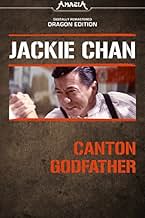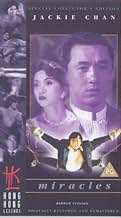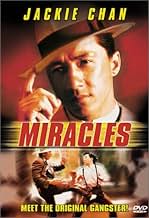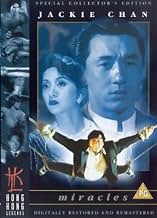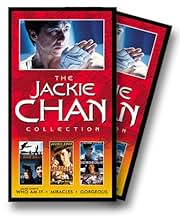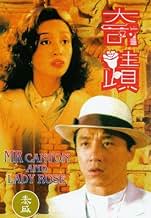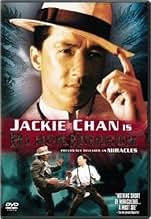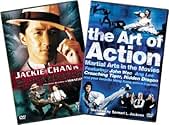IMDb-BEWERTUNG
6,9/10
5836
IHRE BEWERTUNG
Ein Junge vom Land wird zum Anführer einer Bande, indem er von einer alten Dame ein paar Glücksrosen kauft.Ein Junge vom Land wird zum Anführer einer Bande, indem er von einer alten Dame ein paar Glücksrosen kauft.Ein Junge vom Land wird zum Anführer einer Bande, indem er von einer alten Dame ein paar Glücksrosen kauft.
- Auszeichnungen
- 1 Gewinn & 8 Nominierungen insgesamt
Ah-Lei Gua
- Madam Kao
- (as Yah-Leh Gui)
Ko Chun-Hsiung
- Tiger
- (as Chun Hsiung Ko)
Dik-Hak Chan
- Chen Wah's Man
- (as Ti-Ko Chen)
Wai-Yu Chan
- Lady Rose's Friend
- (as Wai-Yue Chan)
Empfohlene Bewertungen
I didn't even know that Jackie made this movie for a long time. Lavishly shot with all star cast. This is one fantastic movie.
Kwok (Jackie Chan) arrives in Hong Kong looking for a job. Within hours, he's swindled of all his money by Tung (Bill Tung). Lamenting his misfortune, he meets the rose lady who's selling roses. Kwok buys one rose from her. Next thing he knows, he's involved in a gang chase. The chase has the boss fatally wounded. He murmurs in his last breath pointing to Kwok that "This man is the new head". Overnight, Kwok becomes the boss of a crime family. He declares "No more crime and killing", but the old habits die hard. Kwok is called in by Tiger - an another gang boss for negotiations. Each time he goes about his business, he buys a rose from the rose lady to give him good luck. One day, he doesn't find the rose lady. He searches for her, and she's in distress. Asking her why, she confesses that her daughter in Shanghai is getting married to a wealthy man's son. But she's been telling her that she's rich which is so far from the truth, and is afraid that when the groom and his father gets to Hong Kong, and sees her, they will cancel the wedding. Kwok has an idea to make the rose lady look rich, and invite all of other gang bosses and make them act as dignitaries in Hong Kong for the wedding party. But two other rival gangs, and inspector from Hong Kong police is about to foul up the whole plan.
There's action, romance, and lot of feel good scenes in this movie. The story telling, and timing things happen can only be experienced in Jackie Chan movies. The actors all perform better than usual attesting to Jackie's ability as a director. The choreography of the fight sequence is one of the best also.
Anita Mui plays the role of Ming - a singer for Kwok's club, and Kwok's love interest. She's great. Her talent will be missed.
This is one heck of a movie, and one of the best movie Jackie Chan produced in the '80s.
Kwok (Jackie Chan) arrives in Hong Kong looking for a job. Within hours, he's swindled of all his money by Tung (Bill Tung). Lamenting his misfortune, he meets the rose lady who's selling roses. Kwok buys one rose from her. Next thing he knows, he's involved in a gang chase. The chase has the boss fatally wounded. He murmurs in his last breath pointing to Kwok that "This man is the new head". Overnight, Kwok becomes the boss of a crime family. He declares "No more crime and killing", but the old habits die hard. Kwok is called in by Tiger - an another gang boss for negotiations. Each time he goes about his business, he buys a rose from the rose lady to give him good luck. One day, he doesn't find the rose lady. He searches for her, and she's in distress. Asking her why, she confesses that her daughter in Shanghai is getting married to a wealthy man's son. But she's been telling her that she's rich which is so far from the truth, and is afraid that when the groom and his father gets to Hong Kong, and sees her, they will cancel the wedding. Kwok has an idea to make the rose lady look rich, and invite all of other gang bosses and make them act as dignitaries in Hong Kong for the wedding party. But two other rival gangs, and inspector from Hong Kong police is about to foul up the whole plan.
There's action, romance, and lot of feel good scenes in this movie. The story telling, and timing things happen can only be experienced in Jackie Chan movies. The actors all perform better than usual attesting to Jackie's ability as a director. The choreography of the fight sequence is one of the best also.
Anita Mui plays the role of Ming - a singer for Kwok's club, and Kwok's love interest. She's great. Her talent will be missed.
This is one heck of a movie, and one of the best movie Jackie Chan produced in the '80s.
7rde
The first thing I noticed about this film is that it seems to star everyone who ever made a movie in Hong Kong; I seemed to spend the entire movie going 'oooh, it's Yuen Biao!' (or whoever). Plotwise, it's typical early Jackie Chan; frenetic action sequences punctuated by high farce. As in a lot of his early stuff, the farce can be a bit excruciating, but not so much that you'll feel obliged to hit fast-forward. The action sequences, while interesting, aren't as spectacular as in his later movies; the movie seems to try to be more of a plot-driven movie (and much as I love Jackie Chan, these aren't really his strong points). If for some bizarre reason you aren't yet a Jackie Chan fan, you'll probably want to check out Armor of God or Project A first. If I'm preaching to the converted, you'll find Oiji merrily passes an hour and a half, but it's by no means a masterpiece. It's got Anita Mui, though. She always makes a movie watchable.
'Miracles' (I actually like the Australian version title 'The Canton Godfather' more) is quite different from usual Jackie Chan's action choreography movies. It is more situation comedy in 1930s Hollywood fashion, but in Jackie Chan's sauce. The magnificent action and fight scenes are still in, but this time the film concentrates more on simple storytelling and comedy with lavishing set pieces depicting 1930's Hong Kong. The film is over two hours long, but it doesnt' drag as the pacing between action scenes is nearly perfect. Jackie Chan's comedic timing and use of slapstick is as masterful as his martial arts skills. Might not be Chan's best movie, but it is still very enjoyable. Sweet but not sticky. And every once in a while it is nice to see one of your favorite heroes doing something little different.
Plus - Jackie Chan himself considers 'Miracles' his best directorial effort.
Plus - Jackie Chan himself considers 'Miracles' his best directorial effort.
Miracles is Jackie Chan's favourite amongst his movies ,and the one in which he invested the most time and care. The result is, technically, a triumph. The convincing sets, lavish costumes and graceful camera work really hold by western film standards, while the fight scenes boast choreography that is just incredible to watch. They are more like musical numbers than martial arts fights, but the level of invention is just staggering, particularly in the scene where Jackie has to make his way down some stairs, fighting heavies as he does so, and the end battle in a rope factory.
However, elsewhere the film has problems. It attempts to juggle several plot lines with mixed success. The 'gangster'part, with Jackie as a crime boss, generally works well, but Jackie's relationship with singer Anita Mui almost disappears from the film and the Frank Capra 'A Pocketful Of Miracles'copied story is dwelt on at such length and so slowly that the middle of the film drags terribly, with endless dialogue scenes that could have sometimes been shortened or cut without harm to the film {or course, there is a shorter version of this film, but with some of the wrong bits cut}. At least there are some great laughs, such as gangsters and their 'molls' trying to be respectable rich folk, and the Clouseau-like Richard Ng's police captain.
Miracles is certainly not one of Chan's classics like Project A, Police Story or Drunken Master 1 and 2, but there is still a lot to like.
However, elsewhere the film has problems. It attempts to juggle several plot lines with mixed success. The 'gangster'part, with Jackie as a crime boss, generally works well, but Jackie's relationship with singer Anita Mui almost disappears from the film and the Frank Capra 'A Pocketful Of Miracles'copied story is dwelt on at such length and so slowly that the middle of the film drags terribly, with endless dialogue scenes that could have sometimes been shortened or cut without harm to the film {or course, there is a shorter version of this film, but with some of the wrong bits cut}. At least there are some great laughs, such as gangsters and their 'molls' trying to be respectable rich folk, and the Clouseau-like Richard Ng's police captain.
Miracles is certainly not one of Chan's classics like Project A, Police Story or Drunken Master 1 and 2, but there is still a lot to like.
It is the 1930's, and naïve country boy Kuo Cheng-Wah has just arrived in Hong Kong. A violent gang war has broken out over the city, which he finds himself in the middle of. After a gang boss bequeaths him his empire, Cheng-Wah opens a nightclub, featuring the sultry singer Yang Luming as star attraction. Meanwhile, Madame Kao, an impoverished street seller, needs Cheng-Wah's help if she is to convince her daughter she is a lady of means. So begins a madcap tale full of action, comedy and romance sure to leave audiences spellbound.
Directed by Jackie Chan and based on Damon Runyon's short story 'Madame La Gimp,' 'Miracles' is a heartwarming, exciting comedy both fun and fast-paced. Runyon's source material had been adapted for the screen twice before by Frank Capra, in 1933 with 'Lady For A Day' and 1961 with 'Pocketful of Miracles,' but Chan's version is by far the most memorable. Combining clever dialogue with strong characterisation and witty set-pieces, the screenplay brims with comedic inventiveness. The narrative is consistently engaging, full of humorous misunderstandings, idiosyncratic characters and hilarious action that would have made Buster Keaton proud.
As is the case with most Chan fare, the film features stunt work and fight choreography that is awe-inspiring. The martial arts world's answer to Fred Astaire, Chan's incredible physicality is on full display, and the rapid-fire action will leave you breathless- when you're not laughing, that is. A sequence in a rope factory has to be seen to be believed; so incredible are Chan and his Stunt Team. Furthermore, the aspects of the narrative involving Madame Kao are handled brilliantly, bringing additional humour and drama to proceedings, while the musical numbers interspersed throughout harken back to the glory days of Hollywood musicals.
Moreover, Arthur Wong's lush cinematography gives the film a richness and fluidity largely missing from Chan's previous pictures. Making expert use of tracking shots and long, single takes, Wong fosters a sense of realism and immersion. A one take shot at the night club is most impressive, swooping over the heads of the audience from the stage, up into Cheng-Wah's office; plunging the viewer deep into the glamourous world of the film.
Eddie Ma's grand production design drips with textural richness. From the bustling streets of Hong Kong, to the velvet and gold rimmed nightclub, to the dusty rope factory, all the locations are detailed and visually interesting. A stunning feast for the eyes, Ma, art director Sai Kan Lam and set decorator Yiu-Kwong But have faithfully recreated 1930's Hong Kong, with a wry, Runyonesque slant. In addition, Lai-Fang Chan and Sun-Yiu Cheung's costume design is intricate and evocative; adding to the personalities of the characters and their world.
Jackie Chan stars as Kuo Cheng-Wah, opposite Anita Mui as Yang Luming and Ah-Lei Gua as Madame Kao. Charismatic and charming, Chan is brilliant in the role, clearly relishing the chance to play an old timey 'Guys and Dolls' style gangster. His terrific comedic timing- combined with his martial arts prowess- is incredible to behold, while he imbues the character with interesting little quirks- like flipping a hat before putting it on- that make him all the more compelling. As director, stunt coordinator and actor; Chan impresses greatly.
As does Anita Mui, demonstrating her considerable comedic, and vocal, talents. She and Chan share a great chemistry that makes watching them together a joy, while her classy performance of the song 'Rose, Rose I Love You' is close to unforgettable. Ah-Lei Gua brings a touching vulnerability to her role, making her compelling and sympathetic. Additionally, Bill Tung is hilarious as a conman Cheng-Wah brings into the fold, while Chun-Hsiung Ko and Lo Lieh make for excellent villains. Also worth mentioning are Wu Ma, as Cheng-Wah's mentor Uncle Hoi, and Richard Ng, as bumbling Chief Inspector Ho, who both give memorable, humorous performances.
In conclusion, Jackie Chan's 'Miracles' is a funny, heartwarming comedy that does justice to its source material, Damon Runyon's 'Madame La Gimp,' while also paying tribute to the work of Frank Capra and the Golden Age of Hollywood. Showcasing Chan's innumerable talents and vision, it is exciting and entertaining, featuring many pulse-pounding action sequences, striking cinematography and a fine score. Well-acted and fun for all the family, it really is a miracle of moviemaking.
Directed by Jackie Chan and based on Damon Runyon's short story 'Madame La Gimp,' 'Miracles' is a heartwarming, exciting comedy both fun and fast-paced. Runyon's source material had been adapted for the screen twice before by Frank Capra, in 1933 with 'Lady For A Day' and 1961 with 'Pocketful of Miracles,' but Chan's version is by far the most memorable. Combining clever dialogue with strong characterisation and witty set-pieces, the screenplay brims with comedic inventiveness. The narrative is consistently engaging, full of humorous misunderstandings, idiosyncratic characters and hilarious action that would have made Buster Keaton proud.
As is the case with most Chan fare, the film features stunt work and fight choreography that is awe-inspiring. The martial arts world's answer to Fred Astaire, Chan's incredible physicality is on full display, and the rapid-fire action will leave you breathless- when you're not laughing, that is. A sequence in a rope factory has to be seen to be believed; so incredible are Chan and his Stunt Team. Furthermore, the aspects of the narrative involving Madame Kao are handled brilliantly, bringing additional humour and drama to proceedings, while the musical numbers interspersed throughout harken back to the glory days of Hollywood musicals.
Moreover, Arthur Wong's lush cinematography gives the film a richness and fluidity largely missing from Chan's previous pictures. Making expert use of tracking shots and long, single takes, Wong fosters a sense of realism and immersion. A one take shot at the night club is most impressive, swooping over the heads of the audience from the stage, up into Cheng-Wah's office; plunging the viewer deep into the glamourous world of the film.
Eddie Ma's grand production design drips with textural richness. From the bustling streets of Hong Kong, to the velvet and gold rimmed nightclub, to the dusty rope factory, all the locations are detailed and visually interesting. A stunning feast for the eyes, Ma, art director Sai Kan Lam and set decorator Yiu-Kwong But have faithfully recreated 1930's Hong Kong, with a wry, Runyonesque slant. In addition, Lai-Fang Chan and Sun-Yiu Cheung's costume design is intricate and evocative; adding to the personalities of the characters and their world.
Jackie Chan stars as Kuo Cheng-Wah, opposite Anita Mui as Yang Luming and Ah-Lei Gua as Madame Kao. Charismatic and charming, Chan is brilliant in the role, clearly relishing the chance to play an old timey 'Guys and Dolls' style gangster. His terrific comedic timing- combined with his martial arts prowess- is incredible to behold, while he imbues the character with interesting little quirks- like flipping a hat before putting it on- that make him all the more compelling. As director, stunt coordinator and actor; Chan impresses greatly.
As does Anita Mui, demonstrating her considerable comedic, and vocal, talents. She and Chan share a great chemistry that makes watching them together a joy, while her classy performance of the song 'Rose, Rose I Love You' is close to unforgettable. Ah-Lei Gua brings a touching vulnerability to her role, making her compelling and sympathetic. Additionally, Bill Tung is hilarious as a conman Cheng-Wah brings into the fold, while Chun-Hsiung Ko and Lo Lieh make for excellent villains. Also worth mentioning are Wu Ma, as Cheng-Wah's mentor Uncle Hoi, and Richard Ng, as bumbling Chief Inspector Ho, who both give memorable, humorous performances.
In conclusion, Jackie Chan's 'Miracles' is a funny, heartwarming comedy that does justice to its source material, Damon Runyon's 'Madame La Gimp,' while also paying tribute to the work of Frank Capra and the Golden Age of Hollywood. Showcasing Chan's innumerable talents and vision, it is exciting and entertaining, featuring many pulse-pounding action sequences, striking cinematography and a fine score. Well-acted and fun for all the family, it really is a miracle of moviemaking.
Wusstest du schon
- WissenswertesAccording to Jackie Chan's autobiography, of all the movies he's ever made, this is his favorite.
- PatzerWhen tripped at his initiation, Gwok begins to fall on his left side but lands on his right in the next shot.
- Alternative VersionenThe international version is cut by 22 minutes from the original Hong Kong release.
- VerbindungenFeatured in Jackie Chan: My Story (1998)
Top-Auswahl
Melde dich zum Bewerten an und greife auf die Watchlist für personalisierte Empfehlungen zu.
Details
Box Office
- Budget
- 64.000.000 HK$ (geschätzt)
Zu dieser Seite beitragen
Bearbeitung vorschlagen oder fehlenden Inhalt hinzufügen

Oberste Lücke
By what name was Miracles - Der beste Boss der Unterwelt (1989) officially released in India in English?
Antwort

